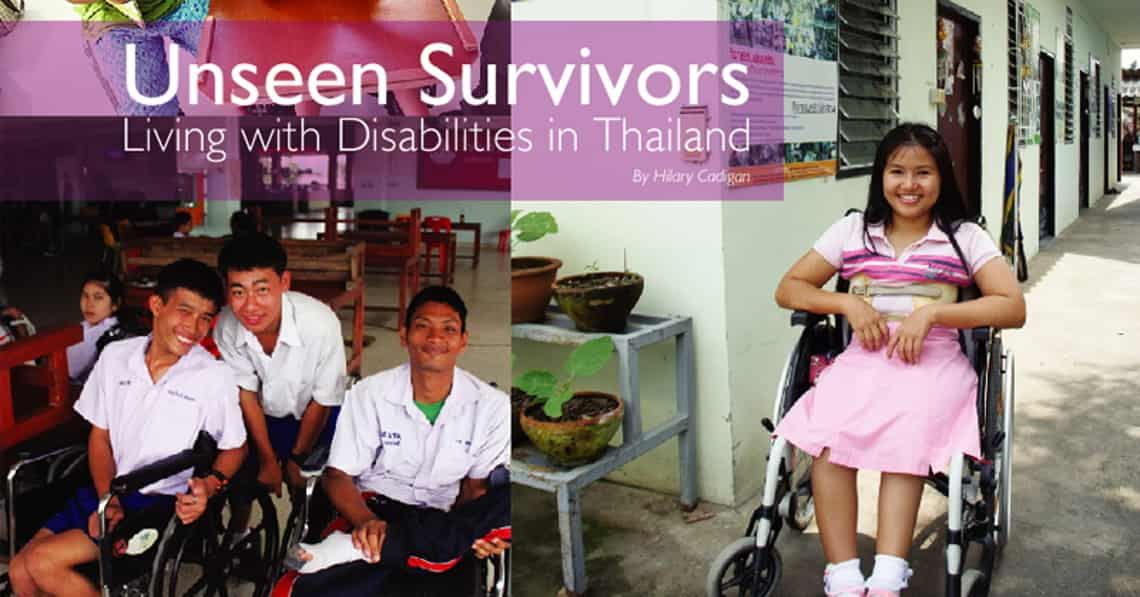Orapin Paiponganurak was seven years old when she became afflicted with Rheumatoid Arthritis, a debilitating autoimmune disorder that attacks the joints. Born to a poor Karen family of farmers in a remote village in Mae Sariang, she was left with few options.
“When I got sick, I couldn’t go to school,” she recalls. “I had to stay in the house alone while my family worked in the field. It was very lonely.”
For four years, Orapin stayed home and things got worse. Despite the fact that Rheumatoid Arthritis has multiple treatment options, she was never taken to a doctor or medicated in any way, because her family didn’t understand her disorder nor believe in modern medicine. And so, her condition continued to worsen, relentlessly attacking and disabling Orapin’s joints. The pain was unbearable, and before long she was unable to bend her knees or her back.
At age 11, Orapin was introduced by a former teacher to a doctor from Chiang Mai. It was the first time a medical professional had examined her, and the doctor immediately brought her to government funded Suan Dok Hospital for treatment, where she stayed for nearly a year before relocating to McKean Rehabilitation Centre for continued care. Unfortunately, despite innumerable experimental surgeries and years of therapy, the damage had already been done. Orapin would not walk again.
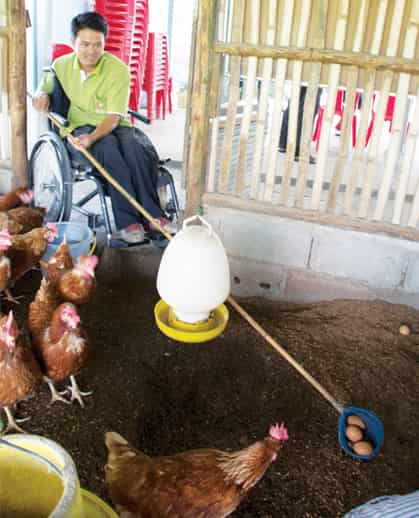
Making Change
Today, Orapin is 37. Bright-eyed and ever-smiling, she has an impressive grasp of English and a charming laugh. The fact that she is confined to a wheelchair and back brace and deals with near constant pain neither defines her nor holds her back. In fact, she has turned her own history of suffering into a lifelong mission to help other people living with disabilities, and to combat the all too common stigmas against them.
“Thai culture can be very nice in many ways, but it’s hard to change attitudes based deeply on Buddhist ideas, which say that it’s your fault if you’re disabled, based on karma from a past life,” says Orapin. “People might say you are good and smart and on the same level, but they treat you differently.”
For the past eight years, Orapin has been living at the Tawan Chai Foundation, a modest living and learning facility in Chiang Mai, where people with disabilities both learn and teach self-sufficiency through organic farming. Located just east of the city, Tawan Chai was founded by Rathee Chaiyapornpattana, McKean’s former Social Director, and currently houses eight people.
Chu Chat, the foundation’s first resident, lost both legs in a motorbike accident at age 17. Now 44, he is a leader at Tawan Chai, a skilled electrician, plumber, farmer, welder, and permaculture expert. Married for nine years to a massage therapist (“But I don’t like massages!” he laughs), Chu Chat rides an adapted motorbike given to him by a Vietnam War veteran, and makes regular trips to rural villages and local prisons to teach workshops on organic farming.
“When I go outside, people who don’t know me often respond negatively, and look down on me,” he tells me in Thai as Orapin translates. “But once they get to know me, they’re impressed and inspired by what I’ve been able to do.”
Orapin wheels gracefully around the property, giving me a tour of the garden, the piglets, the collection of egg-laying hens. She explains that the farming courses are available not only to those with disabilities, but also to tourists and able-bodied locals interested in learning something new. Donations from these students, along with funding from private donors, foreign embassies and NGOs, is what allows Tawan Chai to continue their mission of helping people help themselves.
“When people become disabled, especially if they’re living out in the country, life can be very hard,” Orapin says. “Their families have no idea how to help, so they might just leave them alone in the house and not talk to them. They can’t do anything, and they often get very depressed.”
As such, despite her extreme mobility issues, Orapin dedicates a large amount of her time to travelling around the country, visiting people with disabilities and providing encouragement and support. She has a degree in social work, specialising in home development, which she uses alongside her own personal experience to provide support for those who need it most.
“Their problems were my problems before, so I know what it’s like,” she says with a smile.
Thailand’s Dark Side
Don Willcox is the co-founder and president of the Foundation to Encourage the Potential of Disabled Persons, which has been based in Chiang Mai for the past 24 years. American expat Willcox, 81, and his Thai wife Piranan, a former practical nurse, have dedicated their lives to caring for Thailand’s many citizens, documented and not, who are living with disabilities. Over the years they have given away 22,000 pairs of reading glasses and 4,800 wheelchairs to those who can’t afford their own, frequently travelling deep into the border region to provide mobility to people who have spent most of their lives trapped in their own homes.
“One woman we met had been living with polio since age 18. When we brought her her first wheelchair, she was 60. She’d spent the past 42 years immobile, shut up in her house,” recalls Willcox. “That’s just one story of many. These people are survivors, but nobody sees them. We see them quite often, however, and that’s why we’re still doing this.”
As we sit on the front porch of the Willcox home, four friendly dogs lounging beneath the table, Piranan shows me pictures of a 95-year-old woman they recently helped. Blind and living in a broken down shack in Lamphun, the woman had lain prostrate for years on a thin mattress, filthy from incontinence. “On top of all that, there was a poisonous snake living under the mattress,” Piranan tells me, shaking her head.
Happily, the foundation was able to provide the woman with a free wheelchair, a new mattress, and a new house. “Being able to do that comes with an enormous emotional reward,” adds Willcox.
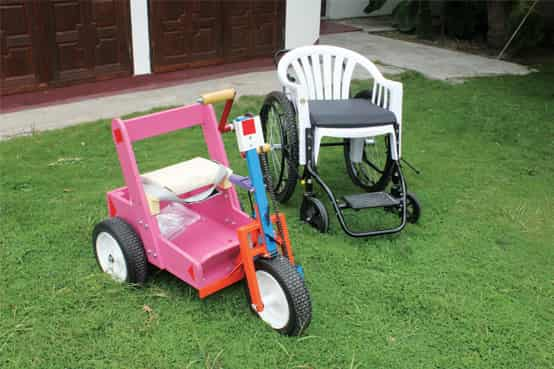
Most of the foundation’s funding comes from a small but loyal pocket of foreign donors, and wheelchairs come free from charities in America. Willcox is grateful for the help, but laments the lack of government-funded care offered in Thailand. Indeed, the Thai government offers only 500 baht a month to people living with disabilities, no matter how severe. The elderly receive an additional 800 baht, but this isn’t nearly enough, especially since the vast majority of these people are unemployed. In addition, Willcox says, the Thai customs department charges exorbitant under-the-table fees just to get the donated wheelchairs into the country.
“The disabled in Thailand are bottom feeders, living at the end of the food chain,” says Willcox wearily. “There is a very condescending attitude toward them from the rest of society.”
Willcox’s own foundation has dealt with multiple issues, such as the time he employed people with disabilities to build wheelchairs in his moo baan. “Eventually we were called into the office of a high government official, where the locals in the village testified that we were lowering property values and spoiling the community,” he says. “In response, the official actually suggested that we gather up all the disabled people and move them to the top of a mountain where no one else would have to see them.”
A New Education
According to a 2008 survey by the Asia-Pacific Development Centre on Disability, 71.5 percent of Thailand’s 1.9 million people living with disabilities are unemployed. Nearly a third receive no education.
“Is the situation improving? Yes, but only incrementally,” says Willcox. “Change is happening very slowly.”
Indeed, it was only a little over a decade ago that the Thai government first acknowledged the need for educational programmes geared specifically toward those living with physical disabilities. Chiang Mai’s Srisangwan School, established in 2001, was the first in the country to cater specifically to children with physical disabilities. Today, it is one of only two such schools in all of Thailand, the other of which is in Khon Kaen.
Located just a few kilometres past Mae Jo University, Srisangwan is a welcoming haven and a hopeful sign of a more encouraging future for those living with disabilities in Thailand. The spacious brick buildings are fringed by smooth concrete playgrounds populated by smiling children – 306 in all, despite the schools 280-person capacity – hizzing about on walkers and wheelchairs. It’s clearly a well-funded operation, with an unprecedented level of accessibility compared to the rest of Thailand. Elevators and ramps abound, along with special desks customised to fit a wheelchair.
“Our goal is to encourage self-sufficiency,” says Phuangtong Sriwilai, the school’s director, in Thai. Friendly, energetic, and dressed in denim, Phuangtong doesn’t resemble the average Thai government worker, and acknowledges this with a laugh as we sip coffee in her office. She explains that attending Srisangwan is completely free, aside from two annual fees: 500 baht for clothes washing and 100 baht for wheelchair repair insurance. The school can also provide wheelchairs free of charge.
“About 60 percent of the students here come from the mountains and are very poor,” she says, adding that many of their disabilities come from poor birthing facilities and motorbike accidents (indeed, Thailand holds one of the highest rates of road accidents in the world).
Phuangtong acknowledges Thai society’s Buddhist notions of karma, noting that the religious and cultural stigma against people with disabilities began with early Buddhist parables of people whose disabilities were the direct result of specific actions in a previous life. For example, someone who cuts the neck of a chicken might not be able to speak in her next life; someone who stabbed his neighbour’s eyes out might be reborn blind.
“We’re pushing against that with modern education, and I think the new generation is breaking away from these silly, old fashioned ideas,” says Phuangtong. She laughs. “Think about it, we all have disabilities. For example, I can’t speak English, and you have glasses!” (True.)
Out on the Streets
Despite Thailand’s increasing levels of tolerance, there are still major issues with accessibility, particularly in the northern provinces. Nic Brown, 36, a Canadian expat who was shot in a Nimmanhaemin bar in June of last year and paralysed from the chest down, can attest to these issues firsthand.
“There are basically no washrooms I can go into, except at some malls, so I usually just have to pee in the street,” says Brown. We’re at the Maharaj Rehabilitation Centre, where he has just finished his bi-weekly physiotherapy session. Since the shooting, he has learned to live life in a wheelchair, and is now quite adept at manoeuvring the streets of Chiang Mai, thanks to Maharaj’s garden obstacle course and friendly team of physical therapists. But it hasn’t been easy.
“The sidewalks here are basically unusable,” he notes. “There’s always a bike, a sign, broken pavement, a sleeping dog…”
So instead, Brown opts for the streets. I join him on his route home, from Maharaj to a guesthouse in the northeast corner of the city. He wheels the whole way, often having to take rather roundabout routes to avoid the steep red and white striped curbs that circumscribe the city (“This is how I get my cardio!” he says). On the way, we observe the reactions of passersby, which range from over-the-top attempts at assistance to utter disregard. Walking next to him, I dodge vehicles that skirt by within centimetres, and Brown recalls the time he got hit by a car not long ago.
“The guy was going pretty slow, but he did knock me over,” he recalls. “About five Thai people ran over to help, which is usually what happens. Actually, Thais offer to help me all the time, to the point that it’s kind of annoying. I think it’s a merit thing.”
And the farang? “Well, everybody’s got a wheelchair story – an uncle or a cousin. Those stories never really go anywhere. People also send me a lot of YouTube videos of like, people in wheelchairs doing 360s in a half pipe. I’m like, cool, but if you were a painter would you want me to send you links to paintings by Rembrandt?” He laughs. “But, I do get a lot of free drinks!”
Wheelchairs For All
Down Canal Road, just behind the new building that’s shaped like a piano, you’ll find the RICD Wheelchair Project headquarters. Serving under the Rajanagarindra Institute of Child Development (RICD), the project was founded in 2000 by RICD Director Dr. Samai Sirithongthaworn. Today, daily operations are in the hands of a dedicated team of both Thai and foreign volunteers, who travel throughout the country and to surrounding areas like Malaysia, distributing wheelchairs to those that need them most.
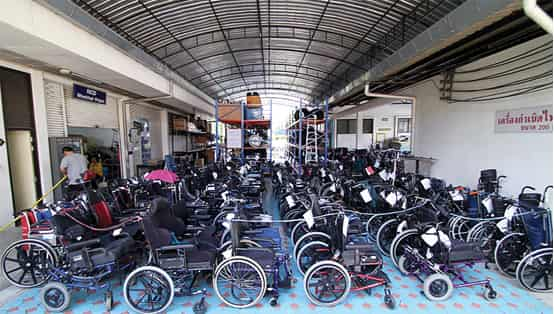
In addition to planned distributions, which require a full application form featuring information about specific needs and photos of the person’s home so as to fit them with the proper equipment, RICD receives an average of five or six unplanned visitors each day, who line up in the early mornings for wheelchair fittings.
“Sometimes these people are driving five or six hours to get here,” says expat project manager Alex (name changed by request). “We can’t send them away, so we have to be flexible. Anyone who needs a wheelchair will be taken care of, no matter how long it takes.” And so it goes; since its inception, the Wheelchair Project has distributed over 17,000 pieces of equipment, most of which are donated from abroad and assembled onsite in Chiang Mai by RICD’s hardworking volunteers. Each distribution comes with a medical check, a professional fitting and extensive safety training, and every person is entered into a digital system that is carefully tracked and monitored. Wheelchairs that are broken or outgrown can be exchanged for new equipment; the only rule is that they can’t be sold.
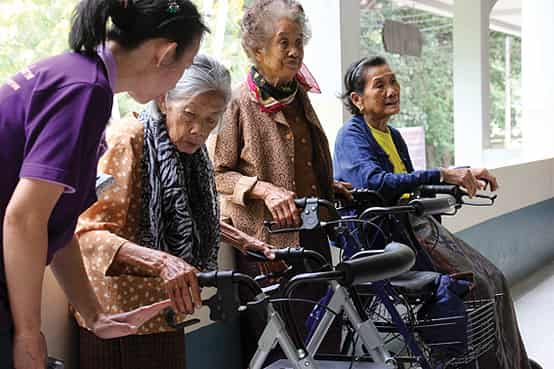
Alex, who is himself in a wheelchair, says that over the past 14 years since the project started, things have changed a lot in Thailand, though there’s still a ways to go. “Oh, I’ve seen it all,” he says, smiling wryly. “The intention is there to help now, but there’s a bit of a disconnect. For example, you might see a ramp that’s too steep to use, or a sign for a wheelchair-accessible bathroom at the top of a flight of stairs.”
While comical at times and frustrating at others, these well-meaning developments are a vast improvement from a decade or two ago, when the Chiang Mai airport didn’t even have disabled parking spaces (Don Willcox actually hand-painted the first ones himself). But as is generally the case, education is crucial in making Thailand more accessible and accepting to those living here with disabilities.
“There is still discrimination, but I think today most people really want to help you,” says Alex. “The problem is the lack of knowledge. Not all people are involved in disability issues, so we can’t expect them to know what to do. But we can ask them to learn.”
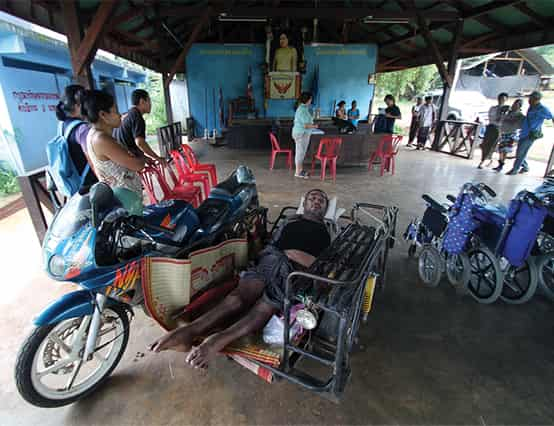
Turn Down For What
This past August, a group of young students in wheelchairs from Srisangwan Chiang Mai School entered into the wildly popular television show, Thailand’s Got Talent. “It started because when you are in a wheelchair all the time, you need exercise, but it can get boring,” recalls school director Phuangtong. “They had to come up with a fun, inventive way to stay in shape, so they decided to start a hip-hop group!”
Thus, the Wheelchair Dance was born. Featuring impressive break-dancing moves set to popular hip-hop music, the team debuted their dancing at a local school dance competition, where they competed against able-bodied kids and won gold. From there, they kept moving up, becoming a national sensation on the way, until they reached the final round of Thailand’s Got Talent. There, they performed their routine (a YouTube must-watch, if you haven’t already) to Lil Jon’s dance anthem “Turn Down for What” and won the grand prize: ten million baht.
“This was a good lesson for Thailand and for the students,” says Phuangtong. “It wasn’t just about people feeling sorry for them. They had real skill. Enough skill to compete against people with legs…and win.”
RICD Wheelchair Project is looking for long-term volunteers. If interested, you can learn more at www.wheelchairproject.com or email them at office@wheelchairproject.com.
For organic farming courses at Tawan Chai Foundation, email
tawanchai143@hotmail.com.
